ExxonMobil is a great and historic company. More importantly, it sells a great product. There is no question about that.
But ExxonMobil’s management? Well… that’s a different story.
Since 2006, when Rex Tillerson became CEO, ExxonMobil has been supporting if not promoting climate alarmism. Tillerson hoped to score political correctness points and to gain competitive advantage via regulation, which favors big companies over small ones. Climate could also be used to advantage against the coal industry.
Current CEO Darren Woods, who took over from Tillerson in 2017, has not backed off promoting climate alarmism, despite the election of climate skeptic President Trump and his policies to unleash the American energy sector.
The question to be addressed here is: Does ExxonMobil CEO Darren Woods’ promotion of climate alarmism break the law?

Unlike virtually anyone else in the world, CEOs of publicly-owned U.S. companies are not allowed to make materially false and misleading statements. It’s against the law for them to lie. There are two pillars of U.S. securities laws — full and honest disclosure and punishment for fraud. Consider, for example, the recent thrashing of Tesla’s Elon Musk by the U.S. Securities and Exchange Commission (SEC) for tweeting false information about Tesla going private.
Is ExxonMobil CEO Darren Woods also guilty of making false and misleading statements? Let’s look at what Woods has to say in ExxonMobil’s 2019 “Energy and Carbon Summary.”
Below is Woods’ letter in whole. You can read (more easily) it, here, on page 3.
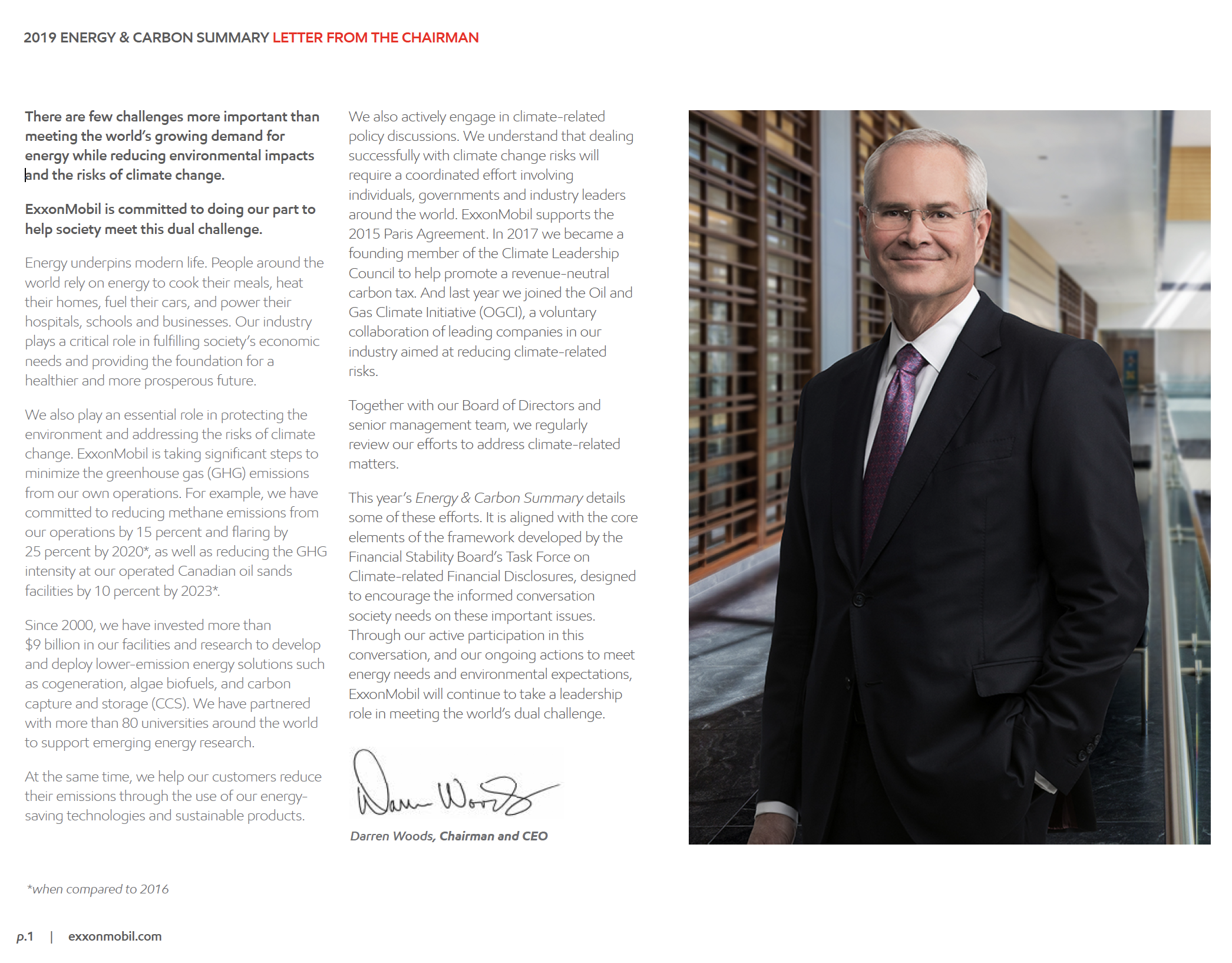
Let’s look at Woods’ letter section by section.
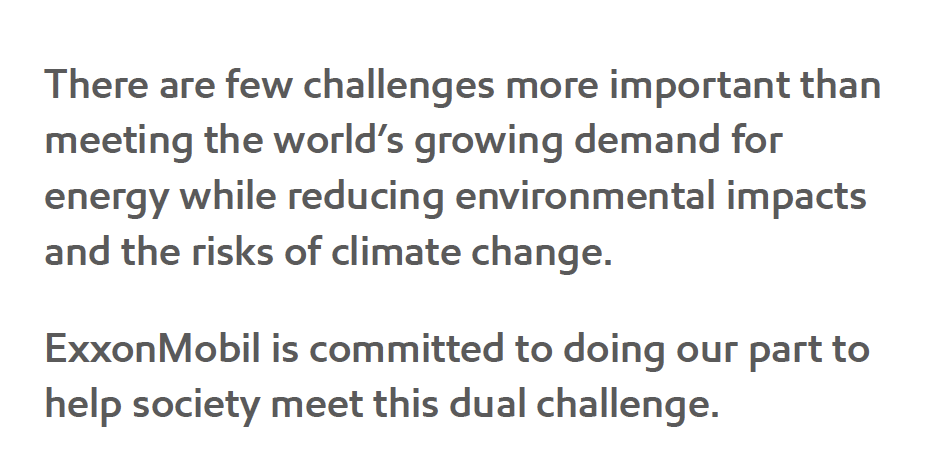
So Woods claims that ExxonMobil is “doing our part” to reduce the risks of climate change. We’ll have to assume that he means the notion of manmade climate change as supposedly caused by manmade greenhouse gas emissions. He can’t mean stopping all climate change because the global climate changes naturally and there is nothing that humanity, let alone ExxonMobil, can do about that. So let’s continue explore whether ExxonMobil is doing “its part” to reduce the risks of manmade climate change as per Woods’ letter.
The next paragraph of interest reads:
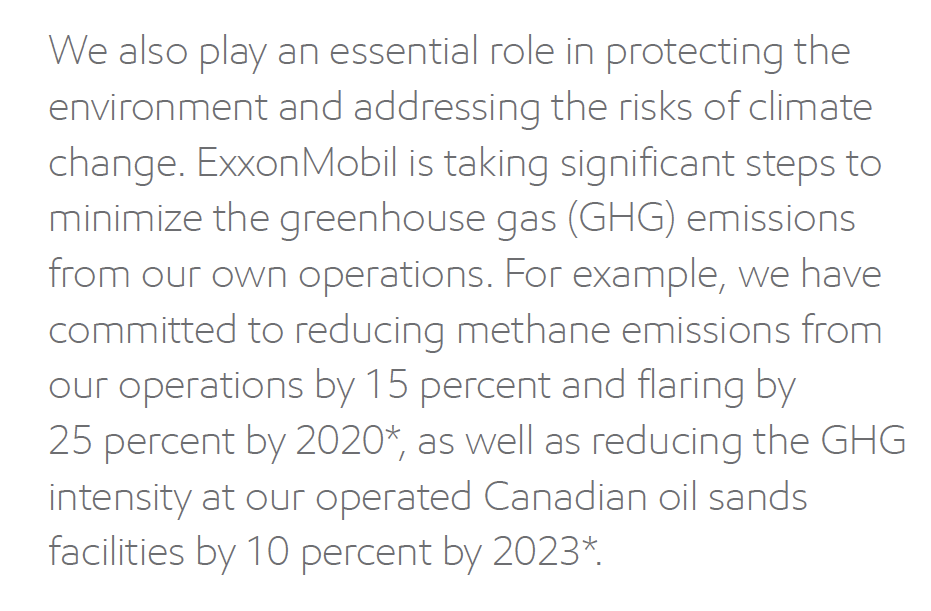
So now it starts too get interesting.
Woods claims ExxonMobil “plays an essential role in addressing the risks of climate change.” Is this true?
Assuming that Woods is referring to manmade climate change and further assuming that manmade emissions of greenhouse gases are causing climate change let’s consider some facts — key facts not mentioned or even alluded to by Woods.
The UN recently estimated manmade global greenhouse gas emissions in 2017 to have been 53.5 BILLION tons of CO2-equivalents — we’ll just call this “CO2” for ease of discussion.

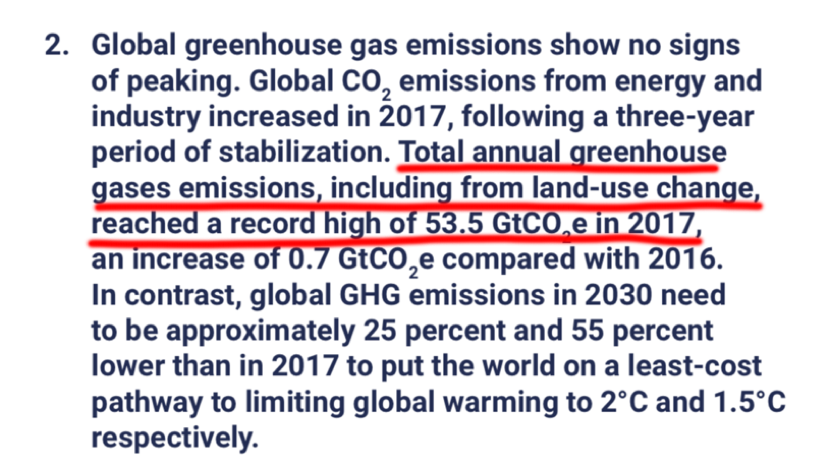
That seems like an awful lot of manmade greenhouse gas emissions and Woods claims ExxonMobil plays an “essential role” in reducing the attendant risk. Is that true?
Before we get to whether ExxonMobil is playing an “essential role” in reducing the risks of manmade emissions, let’s consider the emissions related to ExxonMobil’s business.
According to ExxonMobil’s “2018 Summary Annual Report“, ExxonMobil produced 3,833,000 barrels of oil per day in 2018. Multiply that figure by 365 and ExxonMobil produced about 1.4 billion barrels of oil in 2018. When burned, a barrel of oil emits 0.42 tons of carbon dioxide. So in 2018, ExxonMobil sold oil that when burned produced 587,598,900 tons of CO2 (1.4 billion barrels x 0.42 tons of CO2/barrel).
So how significant is this approximately 588 MILLION tons to global climate change? Well, the math is pretty simple. Dividing 588 MILLION tons of ExxonMobil emissions by 53.5 BILLION tons of annual manmade CO2 emissions, we find that ExxonMobil’s production is responsible for emitting about 1.1% of the manmade CO2 emitted annually.
So if there is a climate change problem caused by manmade CO2 emissions, ExxonMobil is only responsible for about 1 percent of it. If ExxonMobil magically stopped operating, about 99 percent of the supposed problem would still remain. I doubt any IPCC model could discern the climatic difference between 53.5 BILLION tons of emissions and only 47.6 BILLION tons.
Woods maintains that ExxonMobil “plays an essential role in addressing the risks of climate change.” Woods specifically cites commitments to reduce emissions from its methane and Canadian oil sands operations. Although these planned cuts are not specified, we can get an idea of their magnitude from previous operation emissions cuts.
Here’s the chart ExxonMobil presents of its emissions cuts from operations.
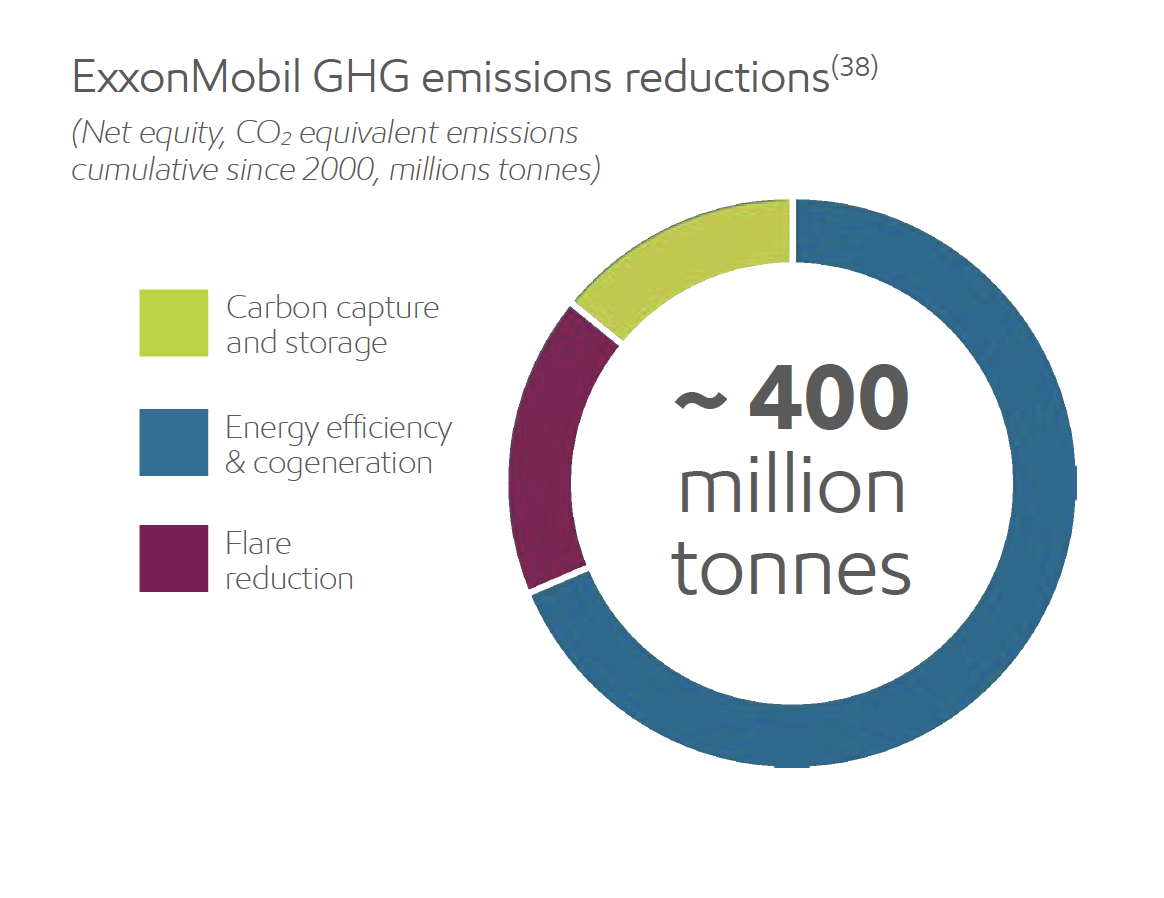
So ExxonMobil claims to have reduced its emissions from operations by 400 million tons since 2000 — the is, emissions from operations have been reduced on average of about 22.2 MILLION tons per year (400 MILLION tons divide by 18 years).
While Woods pats ExxonMobil on the back for reducing operational emissions by 22.2 MILLION tons per year, keep in mind that ExxonMobil sold oil worth 588 MILLION tons of emissions last year… and similar albeit slight lesser amounts in earlier years. Anyway you look at it, though, claims about ExxonMobil’s operational emissions cuts are trivial and simply ridiculous. To unsophisticated readers, they are misleading.
But that is not likely the end of the deception over operational emissions cuts.
Consider the “flare reduction” portion of the operational. That methane not flared off is instead captured to be sold as product. ExxonMobil may not be wasting the methane, but someone else is ultimately burning it as fuel… meaning CO2 emissions.
Next, consider the “carbon capture and storage” claim. To the extent that CO2 emissions are captured and stored, this is through the process of enhanced oil recovery (EOR). This is a total sham as far as CO2 storage goes.
As detailed here, while CO2 may be physically stored through EOR, the CO2 emissions from the oil produced via EOR exceed the amount of CO2 stored. So EOR actually results in a net increase in CO2 emissions.
But however you slice it, ExxonMobil’s operation emissions cuts — even if real — are insignificant in the context of all the oil and gas that ExxonMobil produces.
But keep in mind that Woods maintains that ExxonMobil is playing an “essential role” in reducing the risks of manmade emissions. Well go ahead… divide 22 MILLION by 53.5 BILLION and see what you come up with… that’s right… 22 MILLION is 0.04% of 53.5 BILLION. That’s ExxonMobil’s “essential role”… reducing global emissions by 0.04%? Absurd.
The securities laws require that ExxonMobil disclose material risks to its business. According to guidance from the SEC, it may be appropriate to disclose risks to ExxonMobil’s business from climate change, including business risks from any climate regulations. There is no question that ExxonMobil faces risks from climate regulation, so those disclosures make sense.
But ExxonMobil has gone beyond the disclosure of business risks. The oil giant has bizarrely turned climate hysteria into selling point. “Pat us on the back because we are playing an essential role in cutting emissions,” Woods is saying. That, as the foregoing shows, is demonstrably false and misleading.
When public-owned companies and their managements choose to speak, they must speak truthfully. ExxonMobil CEO Darren Woods is failing to do so.